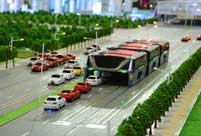

SHANGHAI, July 28 (Xinhua) -- East China's Shanghai, the mainland's first municipality to pass legislation on tobacco controls, is proposing stricter smoking bans at hotels, restaurants, airports and other public venues.
Under a draft revision to the city's tobacco control rule that took effect in March 2010, all indoor areas of hotels, restaurants, airports, railway stations and ports will ban smoking. The existing version allows designated areas for smokers in these places.
Municipal legislators reviewed the bill on Thursday at a session of the Standing Committee of the Shanghai People's Congress, the local legislature.
The amendment would ban smoking in outdoor audience seating and performance venues, outdoor areas of protected cultural heritage sites and crowded waiting areas for public transportation.
Xue Mingyang, chairperson of the municipal legislature's education,science, culture and public health committee, proposed that a requirement for self-discipline be added to the revision by stipulating that "no one may smoke in banned areas, and smokers should try to avoid others when smoking at venues without bans."
He also suggested a smoking ban for queues as people stand very close to each other, leading to second-hand smoke.
The revision represents progress in tobacco control, but more efforts are needed for the legislature to pass it, said Fu Hua, a professor in public health at Fudan University.
China has 316 million smokers, with another 740 million exposed to second-hand smoke. In 2015, about 733,000 Chinese were diagnosed with smoking-related lung cancer.
At least 16 Chinese cities, including Beijing, have passed their own tobacco control rules. The State Council, China's cabinet, unveiled a draft regulation on smoking controls at public venues in late 2014 to solicit public opinions.
Beijing, the capital and home to more than four million adult smokers, rolled out what has been deemed the strictest smoking ban in the city's history on June 1, 2015, prohibiting smoking in indoor public places, workplaces and public transportation.
 Who Will Fit The Chinese Roles In Game Of Thrones?
Who Will Fit The Chinese Roles In Game Of Thrones? China's Hubei Shennongjia added to World Heritage List
China's Hubei Shennongjia added to World Heritage List "Straddling bus" starts production in east China
"Straddling bus" starts production in east China Girl goes viral for finger-long toes
Girl goes viral for finger-long toes Five made-in-China hi-tech breakthroughs
Five made-in-China hi-tech breakthroughs HK-Zhuhai-Macao Bridge to open to traffic
HK-Zhuhai-Macao Bridge to open to traffic China opens its first combined transport service to Nepal
China opens its first combined transport service to Nepal Students take stylish bikini graduations photos
Students take stylish bikini graduations photos Charming dancing students pose for graduation photos
Charming dancing students pose for graduation photos Top 10 livable Chinese cities
Top 10 livable Chinese cities Top 20 hottest women in the world in 2014
Top 20 hottest women in the world in 2014 Top 10 hardest languages to learn
Top 10 hardest languages to learn China’s Top 10 Unique Bridges, Highways and Roads
China’s Top 10 Unique Bridges, Highways and Roads E-mail scandal ruins US democracy myths
E-mail scandal ruins US democracy myths Boycott calls grow against South Korea
Boycott calls grow against South Korea Convict who had paid sex in jail sparks controversy over corruption
Convict who had paid sex in jail sparks controversy over corruption TCM manufacturer’s listing bid aborted after public outcry over bile extractions
TCM manufacturer’s listing bid aborted after public outcry over bile extractionsDay|Week